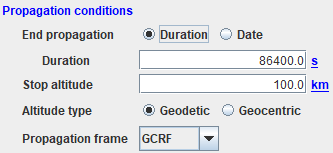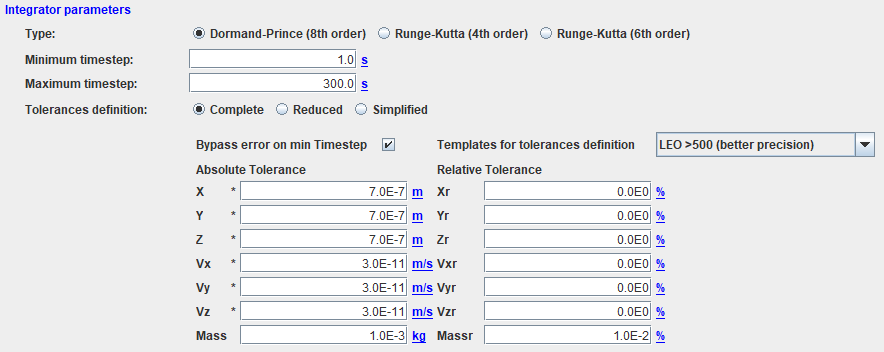Integrator : Différence entre versions
De Wiki
| Ligne 7 : | Ligne 7 : | ||
* Value of the duration or the date of the end of the propagation | * Value of the duration or the date of the end of the propagation | ||
* Altitude of the end of the propagation | * Altitude of the end of the propagation | ||
| + | |||
| + | [[Fichier:PropagationData.png]] | ||
''<font color=#FF0000>'''Note: the propagation will stop once the first event (date or altitude) will occur.'''</font>'' | ''<font color=#FF0000>'''Note: the propagation will stop once the first event (date or altitude) will occur.'''</font>'' | ||
Version du 11 juillet 2017 à 13:38
In this tab we have to kind of information:
Propagation data
First, data linked to the propagation with:
- Duration or date criteria for the end of the propagation
- Value of the duration or the date of the end of the propagation
- Altitude of the end of the propagation
Note: the propagation will stop once the first event (date or altitude) will occur.
Note: it is possible to retro propagate a trajectory by giving a negative duration or a date previous to the initial one.
- Frame used for the propagation (only inertial ones among CIRF, EME2000 and GCRF); the first one is recommended in term of CPU time.
Numerical integrator
Then, we will have numerical integrator tuning:
- If the user chooses a Runge Kutta, only the step will have to be entered
- If the Dormand Price is selected the user will have to tune min/max steps and tolerances (but by default values are available).
Note: be careful, the RK6 is not yet operationnal and may give some erroneous outputs.
Note: in a future version some typical tuning will be proposed depending on the kind of orbit and the desired precision.

